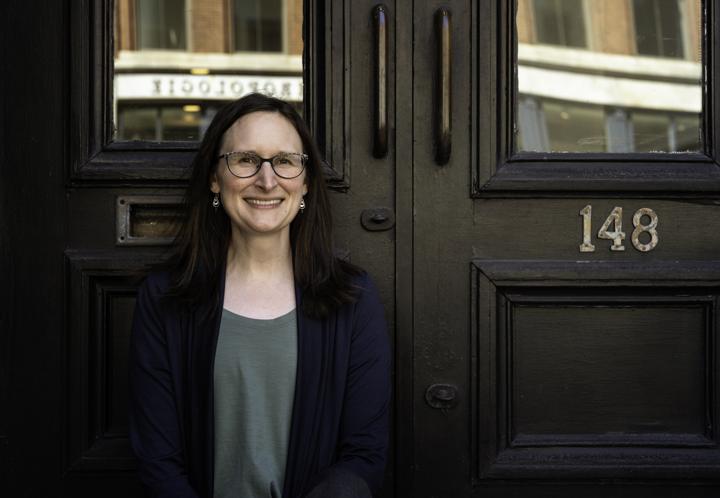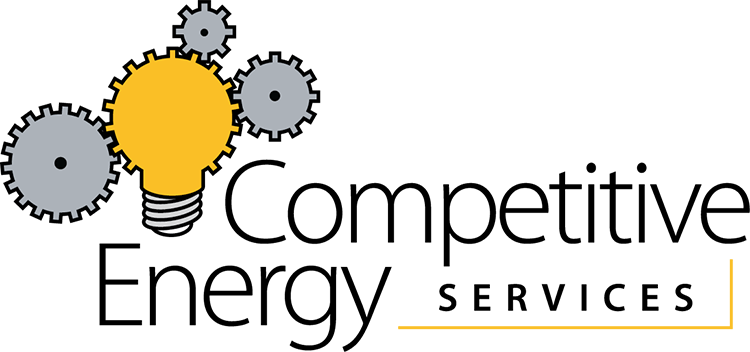
This month’s CES Spotlight shines on Sandy Beauregard, who joined Competitive Energy Services (CES) in 2021 as the Director of Sustainability Services. Sandy is a LEED-accredited mechanical engineer with a Master of Science in Building Systems and Operations and 10 years of experience in energy, building operations, HVAC, and controls.
Each day, Sandy assists clients with sustainability consulting such as greenhouse gas accounting, climate action planning, renewable energy procurement, and energy master planning. Prior to joining CES, Sandy worked as a sustainability and energy efficiency professional in the higher education sector. She received her master’s degree from the University of Massachusetts Amherst and has bachelor’s degrees in engineering and environmental policy from Dartmouth College and Colby College.
On a recent spring morning, Sandy shared a bit more about her professional background, career trajectory, the path she followed into the energy sector, along with some of her personal interests, and a few insights gained along the way.
How did you first get involved in the energy sector? And why energy?
I always wanted to pursue a career that would make a positive environmental impact, so I studied engineering and environmental policy in college. After graduation, I started working in urban planning and transportation engineering, thinking big picture about how people interact with and shape the environment. I learned quickly that the process of planning is very iterative with outcomes that are intangible in the near-term. That got me thinking about the building sector and energy use, so I decided to enroll in the University of Massachusetts, Amherst’s Graduate Studies program in Sustainable Building Systems. Through that experience I was able to focus my professional career on energy use in buildings and energy efficiency. I worked at UMass as a facilities engineer doing energy engineering work on the campus. From there, I wanted to take a broader view and came to CES to work with corporate and higher education clients helping them with their climate goals and decarbonization planning. I feel at CES I am working in energy at a scale that has a positive impact.
What was your initial impression of the energy field and how has your viewpoint changed over the years? What have you learned?
I always thought the energy field, and specifically the work that CES does in this space, was fossil fuel focused. The industry has evolved to have more of an environmental focus, recognizing the impacts of climate change. It also involves making energy choices that have a positive environmental impact, while also making financial sense for our clients. Daily, I see this play out in our client work and it’s very rewarding.
What has surprised you most about working in this industry?
The energy field, which historically has been male dominated, is in the process of changing to be more inclusive of women. As the industry becomes more environmentally focused, the gender piece is evolving along with that change. More and more, women are entering the energy profession and there is an abundance of opportunities for them. It’s nice to see.
You recently celebrated your 2nd anniversary with CES (Happy Anniversary!). How has CES influenced your life and professional trajectory? What keeps you engaged and why CES? And what do you enjoy most about your work?
Before joining CES, I had worked in higher education for most of my career. So, it’s been a great opportunity to work with corporate clients. They have a lot of different reasons for taking on sustainability work. It’s different from higher education – what they are doing and why. I’ve learned so much in my position here by working with such a broad and diverse range of clients. I’ve also learned a lot about energy markets, which I was not involved with prior to now. It’s very interesting. At CES, there’s different work to do and it varies day to day in interesting ways because of our diverse client projects.
Our culture is terrific and CES is committed to fostering a company culture that is welcoming and supportive of people. The company is very intentional and takes real action to foster the kind of company culture that we want. One thing I like a lot about CES that made it easy for me to come here is how team-based our work is. We’re never working on our own. We have it set up so that you’re always supported. For example, with any given client initiative, the CES team on that initiative consists of one Energy Services Advisor and two Analysts. One of us from the consulting side is always involved with the client. We’re focused on doing the best for our clients and our team approach makes that possible.
Share about someone who has influenced you and has supported you over the years?
The energy engineer I worked alongside at UMass, Jason Burbank was a big influence in my career. I worked closely with him basically every day for four years. He had been working in energy for decades and taught me everything about building energy systems, especially in the different types of large buildings we had on campus and the energy distribution systems. Through this experience, I learned about the real drivers of energy consumption that we all need to address. Now, as I work with our higher education clients on energy and carbon master planning, this experience allows me to help them understand and evaluate the infrastructure changes and associated challenges to meet their decarbonization goals.
What would you tell young professionals who are trying to understand the energy markets and enter the field?
It’s a complicated field. There’s quite a bit to learn and you’re not exposed to much of it in college. The best thing to do is to find a job in a place like CES where they are committed to helping you learn all you can, while doing real work. In other words, finding a position that gives you that real experience of learning by doing. Use your network -- where you went to school, LinkedIn, etc. Reach out. People are always happy to hear from you and help. If you have a passion for energy, there are a lot of paths into it. Energy is part of everything we do in life. I often hear from college students or recent grads who are interested in sustainability. They ask how I got involved. I always say follow what you’re interested in doing and do it through the lens of sustainability.
What do you do when you’re not working? What are your interests?
I spend a lot of time wrangling a small child, along with reading and spending time outside –taking advantage of all the reasons we are here in Maine.
Photo by Nina Callanan
